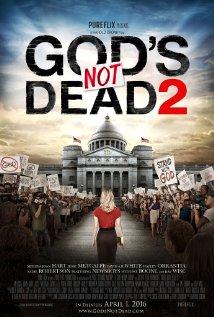No, God isn't dead – but American Christians aren't being persecuted, either

The film God's Not Dead was the sleeper hit of 2014, made for a measly $2million and grossing a stonking $62.6million. It recounts the valiant attempts of a student to stand up for his faith against the attacks of one of his teachers who belittles him and his beliefs at every opportunity. It ends – spoiler alert! – with the teacher dying in a car crash, but before he expires he invites Jesus into his heart, so that's OK.
I watched God's Not Dead with a sort of horrified fascination. It still ranks as possibly the worst film I've ever seen, not because it was badly done – it wasn't, particularly – but because of its message. It was a tabloid with headlines screaming about Christian persecution in the land of the brave and the home of the free. Those Godless liberals are out to get you, it said, and you have to be ready for professional martyrdom.
Now it's back. God's Not Dead 2 stars Melissa Joan Hart as a Christian teacher who is forced before a judge for answering a question about Jesus in the classroom. The trailer shows the prosecution lawyer addressing the defence, saying: "I hate what people like your client stand for. We're going to prove once and for all that God is dead." He later says – cue that music that says this is a really tense, significant moment – that poor Melissa's motive for answering a simple question about Jesus with a scripture reference was "to take an innocent question and turn it into an opportunity to preach".
Melissa's character says at one point: "I would rather stand with God and be judged by the world than stand with the world and be judged by God."
It doesn't look promising, though it will no doubt play very well with its intended audience. They're not just solid evangelical churchgoers. They are the people who claim the evangelical label and whose support is driving Donald Trump to the Republican nomination and possibly to the White House.
The narrative is: it's us against the world. We are an embattled minority. America is hostile to faith. Talk about Jesus at your peril. The might of the law will be deployed against you if you share your faith. Those liberals really are out to get you. There are a few end-time assumptions in there too: it's what you should expect as the Day draws near.
Let's be clear: it is not that Christians aren't under pressure. There are too many examples of Christians facing problems because of their faith to doubt that. The US Supreme Court decision last year that effectively legalised gay marriage in the US, with its implications for evangelical Christians who profoundly disagree with the concept, has focused attention on how Christians are to live in a secular society as never before.
A survey published last July by the Public Religion Research Institute found that 49 per cent of Americans believed discrimination against Christians was as big a problem as discrimination against other groups. People like Kim Davis, the Kentucky court clerk who refused to issue same-sex marriage licences, and Barronelle Stutzman, who refused to provide flowers for a gay wedding, are held up as examples.
On the other hand: thoughtful people – like the Irish Evangelical Alliance's Nick Park, who says he thanks God for secularism – know that privileging religion is a bad thing. No, Christians shouldn't abuse their positions to evangelise, and if they do they should be brought to account. And no, atheists shouldn't be hyper-sensitive and resort to the courts every time they think someone's crossed a line. And while we're on the subject, if anyone objects to being wished a 'Happy Christmas' they're just desperate to be offended.
But a wholesale attack on Christians by the evil minions of an Obama-led government? Come on. America has huge numbers of Christians, its churches are lively and flourishing, its Church leaders have influential platforms. Christians are not persecuted.
The same narrative is found in evangelical circles in the UK, too. There are genuinely outrageous examples of Christians facing problems because of what they say or how they say it. It's appalling that Felix Ngole was asked to leave the University of Sheffield, where he was in the second year of a Masters in social work, because of his views on gay marriage. It's unconscionable that Victoria Wasteney lost her career with the NHS because she prayed with a Muslim colleague. I hope both of them win their appeals, as they richly deserve to do.
But to argue that there is a wholesale bias against religion in general and the Christian faith in particular, in government or in society, is just wrong. Yes, some Christians come up against the law with a bit of a bump when they want to discriminate or proselytise inappropriately. And yes, sometimes the boot is on the other foot and they'll be disciplined or face legal action when they shouldn't. That's what the law's for, to sort out questions like that, and until we settle on a new, more relaxed consensus, that's how it's going to be.
But persecution? No. It's not always going to be easy for Christians to live in the world. But the premise behind the God's Not Dead franchise is poisonous. It feeds conspiracy theories. It makes Christians think people hate them, when they don't. It puts them in trenches rather than at the table together. It sets them at odds with the world rather than in conversation with it.
If God's Not Dead 2 is ever released in UK cinemas, I'd like to picket it. I'd have a sign saying, "Sorry about this. Any atheists fancy a coffee?" I'd enjoy that.
Follow Mark Woods on Twitter: @RevMarkWoods











